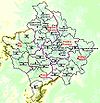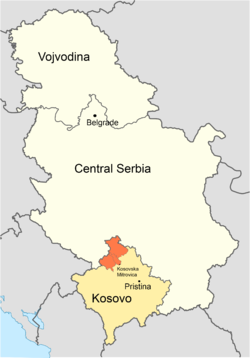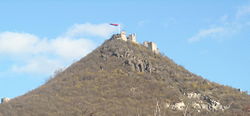- North Kosovo
-
North Kosovo
Северно Косово, Severno Kosovo
Ibarski Kolašin— Disputed Region — North Kosovo is marked in orange 
FlagCapital North Kosovska Mitrovica (de facto) Government – Serbian Assembly of Kosovo and Metohija Radovan Ničić – Serbian National Council for Kosovo and Metohija Milan Ivanović – Ministry for Kosovo and Metohija Goran Bogdanović Area – Total 1,200 km2 (463.3 sq mi) Including: Leposavić, Zvečan, Zubin Potok and North Kosovska Mitrovica Population – Total 68,000 – Density 56.7/km2 (146.8/sq mi) (estimate) Time zone UTC (UTC+1) North or Northern Kosovo (Serbian: Северно Косово, Severno Kosovo; Albanian: Kosova Veriore) refers to a region in the northern part of Kosovo[a] with an ethnic Serb majority that functions largely autonomously from the remainder of the disputed territory, which has an ethnic Albanian majority.[1][2] Ibarian Kolashin (Serbian: Ибарски Колашин, Ibarski Kolašin; Albanian: Kollashini i Ibrit), a toponym that pre-dates the political partition, is also used to refer to the area. Neither the name nor the boundary has any official status in either Kosovar Albanian or Serbian designation: to Pristina, the borders mark a land which is left alone to function independently; to Belgrade, the entire Kosovan region remains subject to the terms of the Kumanovo Treaty.
Kosovo is subject to a contested constitutional status: it had been defined by UNSCR 1244, in the interim, as part of the FRY (being an autonomous province of the constituent republic of Serbia) under United Nations international administration, but its provisional government declared unilateral independence on 18 February 2008 [1] and has since received partial recognition. Most Serb institutions in Kosovo refuse to acknowledge and recognize this, continuing to consider the territory an integral part of Serbia. The Kosovan institutions, in turn, claim the entirety of the territory and oppose any kind of parallel government for Serbs in Kosovo.[3] The entirety of Kosovo is under the effective control of the NATO forces which provide security from external and internal threats [2]
North Kosovo is by far the largest of the Serb-dominated areas within Kosovo, and unlike the others, directly borders Central Serbia. This has facilitated its ability to govern itself almost completely independently of the Kosovo institutions in a de facto state of partition; the authorities in turn choose to observe Belgrade's direct rule which they believe to be the legal authority over Kosovo as a whole. However, despite the region being contiguous with Central Serbia, its location within Kosovo and the subsequent conditions of the Kumanovo Treaty in 1999 mean that access to and from Central Serbia is subject to passing a border transit administered and staffed by UNMIK. This renders the relationship between North Kosovo and Belgrade closer to that of an exclave (an island with its main region). Before the unilateral declaration of independence by the Kosovo authorities, it had been speculated that Kosovo might be partitioned with North Kosovo remaining part of Serbia.[4][5] The complexity of the region is on the agenda of the 2011 Pristina-Belgrade Talks.
Contents
Geography
North Kosovo consists of the region's three northernmost municipalities, Leposavić, Zvečan and Zubin Potok, plus a relatively small portion of Kosovska Mitrovica municipality (North Kosovska Mitrovica). The latter includes those parts of the city of Kosovska Mitrovica proper that are on the north bank of the Ibar River. It covers around 1,200 km², or 11% of Kosovo's land area.[6] Owing to its border with Serbia proper, North Kosovo is not, strictly speaking, a "Serb enclave" or "Serb exclave".
North Kosovo is rich in mineral resources, once known for the Trepča mining complex.
Parts of North Kosovo are:
Demographics
Before the 1999 Kosovo War the area was predominately inhabited by Serbs, with a substantial Albanian minority and smaller populations of Muslims (Gorani and other Slavic Muslims), Roma and Turks. The Yugoslav census of 1991 recorded a population of some 50,500 people in the municipalities of Leposavić, Zvečan and Zubin Potok, of whom most were Serbs, with some Albanians and other small minorities, [6] though the Statistical Office of Kosovo regards the accuracy of this census as "questionable" given that most Albanians boycotted it.[7] The population of Kosovska Mitrovica municipality was predominantly Albanian, with the town itself and two of the nearby villages being ethnically mixed.[8]
The war resulted in major population changes brought about by ethnic cleansing and refugees fleeing the fighting elsewhere in Kosovo. The number of Serbs rose with the arrival of people driven out from other Serbian communities elsewhere in Kosovo. In 2006, the OSCE estimated that the population of the municipalities of Leposavić, Zvečan and Zubin Potok had increased to around 46,000 people, of whom 95.5% were Serbs, 3% Albanians and 1.5% others.[6] Kosovska Mitrovica was split between Serbs and Albanians at the end of the war, with the Ibar River marking the dividing line. The north of Kosovska Mitrovica is now home to approximately 19,000 Serbs and 3,000 members of other minorities. Most of the Roma population was displaced to the north, while small numbers of Turks and Goranis continue to live on both sides of the river. The OSCE has, however, been unable to estimate accurately the population of the municipality.[8]
Such figures would total to an approximate North Kosovo population of 68,000, of which slightly more than 95% is ethnically Serb. Based on a PISG estimate of a total Kosovan Serb population of 112,700,[9] 60% of all Kosovo's Serbs live in North Kosovo. A special bus service operates in parts of North Kosovo to facilitate the movement of non-Serb residents around the territory.[10] The bus operates with an accompanying security presence to ensure the safety of the passengers and permits those residents to more safely enter and leave the North Kosovo area.[10]
Economy
The economy of the region was devastated by the war - by 2006, the unemployment rate had reached 77% in Kosovska Mitrovica municipality. The largest employer was the Trepča mining complex in Zvečan which employed 4,000 people at the height of its operations. However, it was shut down in August 2000 due to the severe pollution which it was producing. The economic situation has deteriorated significantly in recent years due to a lack of capital investment, exacerbated by the uncertainty caused by the political dispute over the region's future. The region uses the Serbian dinar rather than the euro used elsewhere in Kosovo.[6][8] Smuggling of goods such as alcohol have become a business in North Kosovo where the customs authorities of the Kosovo authorities are unable to enforce the customs regulations of the Kosovo authorities.[10] The Kosovo customs authorities do, however, attempt to curtail the flow of illegal goods from North Kosovo into the rest of Kosovo and have an elaborate network of surveillance cameras in place in that regard.[10] The smugglers smuggle goods over the porous frontier between Central Serbia and North Kosovo.[10]
Government, Politics and the Rule of Law
Politics
Since 1999, the Serb-inhabited north of Kosovo has been governed as de facto independent from the Albanian-dominated government in Pristina. It uses Serbian national symbols and participates in Serbian national elections, which are boycotted in the rest of Kosovo; and in turn, it boycotts Kosovo's elections. The municipalities of Leposavić, Zvečan and Zubin Potok are run by local Serbs, while the Kosovska Mitrovica municipality had rival Serb and Albanian governments until a compromise was agreed in November 2002, whereby the city has one mayor.
The region has united into a community, the Union of Serbian Districts and District Units of Kosovo and Metohija established in February 2008 by Serbian delegates meeting in Kosovska Mitrovica, which has since served as North Kosovo's capital. The Union's President is Dragan Velić. This union is not recognised by Kosovo authorities, or by UNMIK.[11]
There is also a central governing body, the Serbian National Council for Kosovo and Metohija (SNV). The President of SNV in North Kosovo is Dr Milan Ivanović, while the head of its Executive Council is Rada Trajković.
Local politics are dominated by the Serbian List for Kosovo and Metohija. The Serbian List is led by Oliver Ivanović, an engineer from Kosovska Mitrovica.
Government
The principal issue facing the region is its future relationship with Serbia and independent Kosovo. The North Kosovo Serbs have taken a consistently hard line, refusing to cooperate with the government in Pristina or to take up their seats in the Assembly of Kosovo. Their stance has been encouraged by the Serbian government of Vojislav Koštunica & they remain in control of this area of Kosovo with parallel Serbian structures.
However, Ivanović and other Kosovo Serb leaders have expressed increasing frustration at Belgrade's approach and have voiced their support for a more moderate stance, speaking openly of rejoining the Assembly of Kosovo and taking part in its government. This line has proved highly controversial, as many Kosovo Serbs reject any compromise; in February 2004, Ivanović's car was destroyed by a bomb explosion outside his home in Kosovska Mitrovica.[12][13]
The Serbian government, the Serbian List, the Government of Kosovo and the United Nations all officially oppose the separation of North Kosovo from the rest of the province. However, many Serbs in the region are adamantly opposed to living under the rule of an Albanian-majority provincial government and reject an independent Kosovo. Ivanović has spoken out against partition, pointing out that more than 60,000 (50%) of the Serb population of Kosovo lives south of the Ibar, and that all of the important cultural and economic assets of the Kosovo Serbs are in the south of Kosovo.[14]
Most inhabitants of North Kosovo have boycotted the elections for the provisional institutions held in November 2007 upon advice from Belgrade, putting themselves in an awkward situation, as ethnic Albanian parties are leading on all local elections in North Kosovo.
In February 2007 the Union of Serbian Districts and District Units of Kosovo has transformed into the Serbian Assembly of Kosovo and Metohija presided by Marko Jakšić. The Assembly strongly criticized the independence moves of the Kosovo Assembly and demanded unity of the Serb people in Kosovo, boycott of EULEX and announced massive protests in "support of Serbia's sovereignty over Kosovo." On 18 February 2008, a day after Kosovo's unilateral declaration of independence, the Assembly declared it null and void in an open assembly together with the presence of the pro-Serb opposition from Montenegro.
In June, 2008 the Community Assembly of Kosovo and Metohija was gathered to coordinate the efforts of the Serbian community in North Kosovo.
In 2011, former President of Kosovo Behgjet Pacolli crossed into the Northern part of Kosovska Mitrovica in a sign of unity. It marked the first time that a high ranking Republic of Kosovo official visited Northern Kosovo. Such a symbolic gesture was accompanied by a heavy security presence.[15]
Rule of Law
Law enforcement and green border checkpoints are carried out by KFOR, EULEX and Kosovo Police. According to an International Crisis Group report, covert agents of Serbian police also operate in the area.[16] [17] North Kosovska Mitrovica in particular continues to remain a hot spot for organized crime.[16]
"To build trust and confidence, Kosovo authorities need to be attentive to culture and religious symbols, such as the Serb Orthodox cemetery in Mitrovica, on the Albanian, south, bank of the Ibar. The main Albanian cemetery is in the North and intact. The Serb cemetery is devastated, hundreds of headstones in shards and the chapel at its centre desecrated and burned. Most of the damage dates to 1999 and March 2004, but also to 2007 and 2008. The site is unguarded and open to sporadic vandalism, some allegedly perpetrated by residents of a neighbouring Ashkali settlement apparently seeking to ingratiate themselves with Albanians by lashing out at Serbs. Northern Serbs often cite the two cemeteries as signs of their tolerance and Albanian hostility. The Kosovo authorities’ failure to repair and secure the graveyard sends a terrible message to Northern Serbs: this is what your future will look like, once you have integrated." [18]
Notable Inhabitants
- Milan Biševac - football player
- Miloš Krasić - football player
- Stevan Stojanović, Former Football player. Won the European Cup in 1991 with Red Star Belgrade.
See also
- 2011 Kosovo–Serbia border clashes
- Partition of Kosovo
Notes and references
Notes:
a. ^ Kosovo is the subject of a territorial dispute between the Republic of Serbia and the self-proclaimed Republic of Kosovo. The latter declared independence on 17 February 2008, while Serbia claims it as part of its own sovereign territory. Its independence is recognised by 85 UN member states. References:
- ^ BBC, Could Balkan break-up continue?, 22.02.08
- ^ Krstraica, August 28, 2009
- ^ Kosovo PM: End to Parallel Structures, BalkanInsight.com, March 7, 2008
- ^ Kosovo partition 'on the table'
- ^ BIRN - Serbia Plays Kosovo Partition Card
- ^ a b c d OSCE profiles of Leposavić 18,600 including 18,000 Serbs and 200 Albaneses, Zubin Potok 14,900 "with a vast Kosovo Serb majority" with 800 Kosovo Albanians, and Zvečan "The estimated total population is 17,000 with a large Kosovo Serbian majority (approximately 16,000). Some 350 Kosovo Albanians (...)", 1 May 2006
- ^ Kosovo and its Population, Statistical Office of Kosovo, September 2003
- ^ a b c OSCE profile of Kosovska Mitrovica, 1 May 2006
- ^ Statistical office of Kosovo
- ^ a b c d e France 24 'programme length' special report on Kosovo broadcast on 24 December 2010
- ^ "Kosovo Serbs launch new assembly", BBC News, 28 June 2008, http://news.bbc.co.uk/2/hi/europe/7478865.stm
- ^ "Kosovo", Jane's Sentinel, July 2006
- ^ UNMIK Condemns And Investigates Incident, B92, February 10, 2005
- ^ Oliver Ivanović interview, Danas, Belgrade, pp. 12-13. 9 December 2006
- ^ President Pacolli visits the northern part of Mitrovica, President of the Republic of Kosovo, February 26, 2011
- ^ a b North Kosovo: Dual Sovereignty in Practice, International Crisis Group, 14 March 2011
- ^ http://www.bbc.co.uk/news/world-europe-14303165 Kosovo tense after deadly clash on Serbian border, BBC News, 26 July 2011
- ^ (in English) North Kosovo: Dual Sovereignty in Practice. N°21. Crisis Group Europe Report. 14 March 2011. pp. 11. http://www.crisisgroup.org/~/media/Files/europe/balkans/kosovo/211%20North%20Kosovo%20---%20Dual%20Sovereignty%20in%20Practice.ashx.}}
External links
- International Crisis Group. NORTH KOSOVO: DUAL SOVEREIGNTY IN PRACTICE, Europe Report N°211 – 14 March 2011
- Andrew Purvis (2008-06-04). "Postcard from Mitrovica: Almost Mellow at Kosovo's Front-Line Cafe". TIME Magazine. http://www.time.com/time/world/article/0,8599,1811795,00.html. Retrieved 2010-05-17.
- Kosovo section at International Crisis Group
Geographical regions of Kosovo Binačko Pomoravlje • Drenica • Gollak / Goljak • Gora • Has • Kollashini i Ibrit / Ibarski Kolašin • Kosovo • Fushë Kosovë / Kosovo Polje • Rrafshi i Llapit / Malo Kosovo • Dukagjin / Metohija • Opoja / Opolje • Podgor • Rugova / RugovoNorth Kosovo 
Kosovo Dečani • Đakovica • Dragaš • Glogovac • Gnjilane • Istok • Kačanik • Klina • Kosovo Polje • Kosovska Kamenica • Kosovska Mitrovica • Leposavić • Lipljan • Mališevo • Novo Brdo • Obilić • Orahovac • Peć • Podujevo • Priština • Prizren • Štimlje • Srbica • Štrpce • Suva Reka • Uroševac • Vitina • Vučitrn • Zubin Potok • Zvečan New Municipalities: Đeneral Janković • Gračanica • Junik • Klokot-Vrbovac • Mamuša • Parteš • RanilugCategories:
New Municipalities: Đeneral Janković • Gračanica • Junik • Klokot-Vrbovac • Mamuša • Parteš • RanilugCategories:- Geography of Kosovo
- Subdivisions of Kosovo
- North Kosovo
- Serbian enclaves in Kosovo
- Parallel structures in Kosovo
Wikimedia Foundation. 2010.



